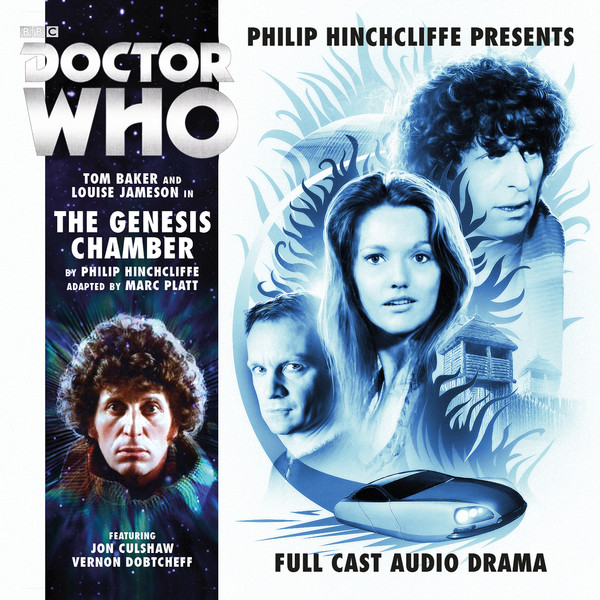When an an era is so beloved any release associated with it comes with certain expectations. Hinchcliffe conjures images of dour gothic horror, of Hammer pastiches and of a morose restrained Tom Baker. This release is none of those things. Its an odd release and very difficult to review – the name Hinchcliffe carries a lot of weight and I want to do this release justice as a story in its own right. Unlike the era in which Philip Hinchcliffe was producer, this is a story that was actually written by the man himself rather than something that had his overall input and vision all over it. This is a very different proposition with not a 1930’s horror themed cliche in sight (or earshot) in fact it could be seen not as a revisit of the Hinchcliffe era but a story that could have been written by him but produced in the Graham Williams era.
Now I am a HUUUGE Graham Williams era fan, its my joint favourite era of the “classic” series along with Cartmel and this story has many of the tropes of his era – an overtly funny Tom Baker, an epic plot that probably looked better on paper than it could ever have done on screen, in fact listening to this release I kept wondering just HOW ON EARTH could this have been realised in 1977 on a BBC budget? Want to know more? Then read on…
It has a very interesting beginning – the Doctor is having a nightmare, he wakes and is visibly disturbed by what he has dreamt – the dream involved him being a creature with 13 heads (obviously referring to his 13 incarnation) and Tom plays this in a haunted distant way that we don’t often see in his portrayal. The main plot is very typical mid 1970’s style Sci-Fi involving colonies that have degreased into factions (think Face of Evil) where one faction have embraced technology to the extent that they cannot function without their city wide system “Inscape” and the others have rejected technology and gadgetry altogether and set up a commune outside the city. Obviously the leaders of each faction are at loggerheads and Never the twain shall meet, but when the President of the City’s children steal a car and go out to the commune everything is about to change. There is romance, danger, death, disaster, long hidden secrets and a charming manipulative villain…
So far, so familiar. And that I think is the problem, the story is very very familiar, it is almost a greatest hits of the late Hinchcliffe, early Williams eras and is incredibly by the numbers. I hate being negative so lets look at the positives – Tom Baker sparkles as Doctor number 4, his default setting seems to be the Williams era version of his Doctor, all charm, madcap grins, random lunacy boggling eyes, Louise Jameson adds yet further levels of character to Leela, we see in her blossoming romance with Dack (Elliot Chapman) how she is her own person and will make her own choices in life. The villain of the piece Volor (Gyuri Sarossy) is again a very interesting character – on the one side an oily supercilious toady – on the other a dangerous game player with his own agenda and morality. There is a lot to like in the performances and in the characterisation and also the sound design, but the plot seems far too stretched out over six episodes, maybe a there of four parter would have tightened the plot up. As Groucho Marx once said “give the people what they want” and Who fans of a certain type are always clamouring for more Hinchcliffe era Who – Big Finish have been very brave here giving the people what they want, but not maybe what they might expect. A very 1977 story that could never have been made in 1977 written by a producer who never wrote a story for the TV series and executed in the style of story from the first year of his replacement – definitely not what I was expecting – a simple familiar story that outstays its welcome by an episode or three, but is full of charming performances and lovely little character moments. Not nearly as gothic a Genesis as its Dalek themed namesake 6/10.

No comments:
Post a Comment